Let's face it, the shank steak doesn't always get the love it deserves. It's often overshadowed by its more glamorous counterparts, but trust me, this humble cut holds a world of flavour waiting to be unleashed. As a seasoned cook, I've learned that with a little patience and the right techniques, you can transform this tough, fibrous meat into a melt-in-your-mouth delicacy that'll leave you wanting more.
Over the years, I've experienced the highs and lows of cooking shank steak. I've had my fair share of dry, chewy disasters, but I've also created some truly unforgettable meals that have left guests raving. And that's what this guide is all about - sharing my hard-earned knowledge, my tips and tricks, to help you achieve that same level of culinary satisfaction. Get ready to embark on a journey with me, step by step, as we unlock the secrets to cooking a truly tender and flavorful shank steak.
(Part 1) Understanding the Shank
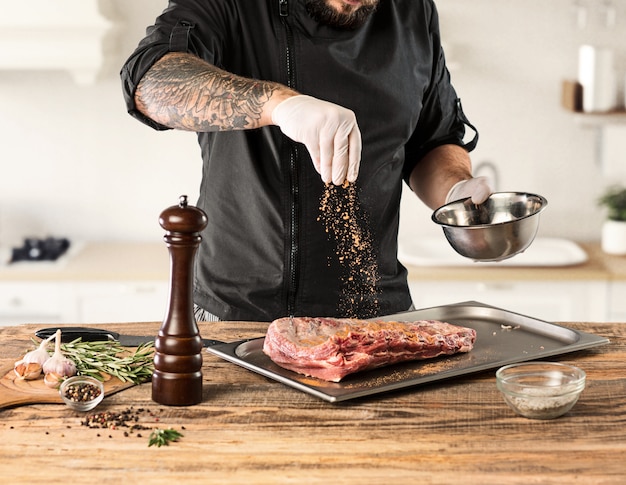
1. What is a Shank Steak?
Before we dive into the details, let's start with the basics. A shank steak is a cut of meat from the leg of a cow, usually from the lower part. Think of it as the "calf muscle" of the beast. Now, since it's a muscle that gets a lot of exercise, it naturally has a denser, tougher texture compared to other cuts. But don't let that deter you. With the right approach, we can transform those tough fibers into a juicy, melt-in-your-mouth delight.
2. Types of Shank Steaks
You'll find a few different types of shank steaks at the butcher counter:
- Beef Shank: This is the most common variety. It's often called "osso buco" when it's bone-in, and you'll find it in both regular and "chuck" varieties.
- Veal Shank: Veal shank, coming from younger calves, is a little more delicate and tender than beef shank. It's often braised or slow-cooked for a melt-in-your-mouth texture.
- Lamb Shank: Lamb shank, known for its rich flavour, is a tender cut commonly roasted or braised and often served with Mediterranean-inspired flavours.
For this guide, we'll focus on beef shank, but the principles we'll discuss apply to all types.
(Part 2) Choosing the Perfect Shank Steak
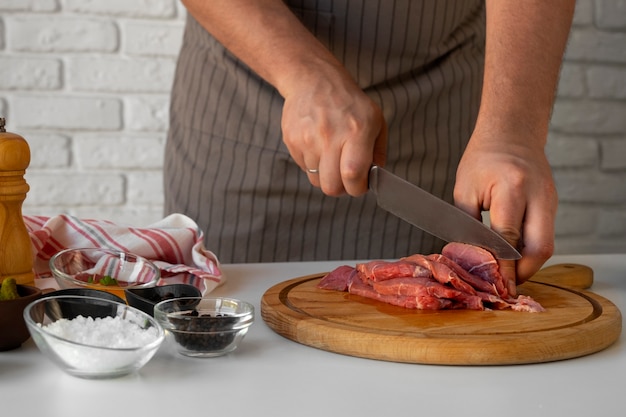
Picking the right shank steak is crucial to achieving a delicious end result. Here's what to keep in mind:
1. Look for a Good Marbling
When you're at the butcher counter, look for a shank steak with good marbling – those little streaks of fat interwoven throughout the meat. Fat equals flavour! It adds richness and moisture to the final dish, and it also helps to tenderize the meat during cooking. Think of it as a secret weapon for juicy, succulent results.
2. Don't be Afraid of the Bone
Bone-in shank steaks are often considered the gold standard. The bone helps to impart flavour to the meat during cooking and also prevents it from drying out. But don't worry, you can also find boneless shank steaks, which are a bit easier to handle. Ultimately, the choice is yours.
3. Consider the Size
Shank steaks come in different sizes, so choose one that suits your needs. A single shank steak can easily feed two people, but if you're cooking for a crowd, you might want to grab a couple.
(Part 3) Preparing the Shank Steak
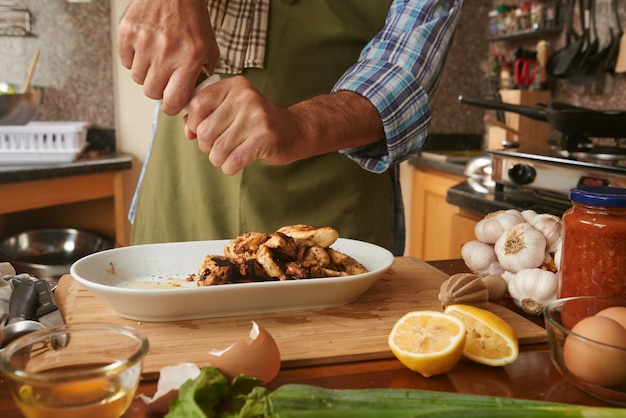
Once you have your perfect shank steak, it's time for some basic prep to set the stage for a flavourful masterpiece:
1. Trim the Excess Fat
Before you start cooking, trim off any excess fat from the shank steak. You don't want to remove all of it, but trimming away the large chunks will help to prevent the steak from becoming greasy.
2. Season with Salt and Pepper
Salt and pepper are the foundation of any good steak seasoning. Liberally apply them all over the shank, making sure to coat every nook and cranny. This simple step amplifies the natural flavours of the meat.
3. Go Beyond the Basics
While salt and pepper are essential, don't be afraid to get creative! Experiment with other spices and herbs, like garlic powder, onion powder, paprika, or rosemary. You can even create your own custom spice blend to suit your taste buds.
(Part 4) Cooking Methods for Shank Steak
Now, let's move on to the heart of the matter - the cooking! Shank steak shines when cooked slowly and gently. Here are some reliable methods to consider:
1. Braising: The Ultimate Transformation
Braising is my personal favourite way to cook shank steak. It involves searing the meat to create a delicious crust, followed by simmering it in liquid until it becomes incredibly tender. The liquid, which can be broth, wine, or even beer, transforms into a rich, flavorful sauce that enhances the entire dish.
How to Braise:
- Sear to Perfection: Heat a heavy-bottomed pot or dutch oven over medium-high heat. Add a little oil and sear the shank steak for about 5 minutes per side, until nicely browned. This step creates a beautiful crust that locks in the juices.
- Build the Braising Liquid: Remove the steak from the pot and add your chosen braising liquid, along with any vegetables you like. Carrots, onions, celery, and garlic are classic additions, but feel free to experiment with your favourites.
- Simmer to Tenderness: Return the steak to the pot, bring the liquid to a simmer, cover the pot, and cook over low heat for at least 2 hours, or until the meat is incredibly tender.
- Rest and Enjoy: Once the steak is cooked, remove it from the pot and let it rest for a few minutes before slicing and serving. The resting time allows the juices to redistribute for a more flavorful, tender result.
2. slow cooking: Effortless Tenderness
If you're looking for a hands-off approach, slow cooking is a great option. It's a simple method that delivers wonderfully tender and flavorful results.
How to Slow Cook:
- Prep the slow cooker: Place the shank steak in your slow cooker.
- Add the Braising Liquid: Pour in your chosen braising liquid and any desired vegetables.
- Slow and Steady: Cook on low heat for 6-8 hours, or until the meat is fork-tender.
3. Roasting: Traditional and Delicious
Roasting shank steak in the oven is a fantastic option if you're looking for a more traditional approach. It delivers a beautiful crispy exterior and a juicy interior, making it a satisfying choice.
How to Roast:
- Preheat the Oven: Preheat your oven to 350°F (175°C).
- Prepare the Steak: Place the shank steak in a roasting pan.
- Roast to Perfection: Roast for about 1-1.5 hours, or until the internal temperature reaches 145°F (63°C).
4. Beyond the Basics: Exploring Other Methods
While braising, slow cooking, and roasting are the most popular methods for shank steak, you can explore other techniques for a different culinary experience.
- Pressure Cooking: A pressure cooker can dramatically reduce cooking time, making it a great option for a quick weeknight meal.
- Sous Vide: sous vide cooking involves sealing the shank steak in a vacuum bag and immersing it in a water bath at a precise temperature for an extended period. The result is perfectly cooked, evenly tender meat with a consistently delicious texture.
(Part 5) Mastering the Perfect Texture
The ultimate goal when cooking shank steak is to achieve that perfect level of tenderness. We're aiming for a melt-in-your-mouth experience, not a tough, chewy struggle.
1. The Power of Patience
As we've already discussed, the key to tenderness lies in slow, gentle cooking. This allows the collagen and connective tissues to break down, transforming the tough fibers into a tender, succulent texture.
2. Don't Overcook It!
Overcooking is the biggest enemy of tender shank steak. If you cook it for too long, it will become dry and tough, undoing all your hard work. Keep a close eye on the internal temperature of the meat, and use a meat thermometer to ensure it's cooked to your liking.
(Part 6) The Art of Flavor
The flavor of shank steak comes from the rich, savory notes developed during the slow cooking process. But there are also a few techniques you can use to enhance its natural deliciousness.
1. The Importance of Braising Liquids
The braising liquid is key to building flavor. A good braising liquid not only tenderizes the meat but also adds depth of flavour that elevates the entire dish.
- Broth: beef broth is a classic choice, but you can also use chicken broth or vegetable broth for a more subtle flavour.
- Wine: Red wine, like Cabernet Sauvignon or Merlot, adds a rich, fruity flavour that complements the meat beautifully.
- Beer: A dark beer, like stout or porter, can add a smoky, malty flavour that creates a complex dimension.
- Tomato Sauce: Tomato sauce adds a tangy, sweet flavour that balances the richness of the meat.
2. Herbs and Spices: A Symphony of Flavour
Herbs and spices add a burst of flavour that takes your shank steak to the next level. Experiment with these combinations for a culinary adventure:
- Mediterranean: Rosemary, thyme, oregano, garlic, and lemon for a bright, fragrant experience.
- Italian: Sage, garlic, oregano, and black pepper for a classic, robust flavour.
- Indian: Cumin, coriander, turmeric, ginger, and garam masala for a warm, complex flavour profile.
- Asian: Soy sauce, ginger, garlic, and sesame oil for a savory, umami-rich flavour.
3. Don't Underestimate the Power of Vegetables
Vegetables aren't just a side dish; they play a crucial role in building flavour. As they cook in the braising liquid, they release their own unique flavours and add texture to the final dish.
- Classic Braising Vegetables: Carrots, onions, celery, and garlic create a foundation of flavour.
- Other Options: Mushrooms, potatoes, leeks, and tomatoes add a variety of textures and flavours.
(Part 7) Serving Suggestions
Now, let's talk about the perfect accompaniments to showcase your tender and flavorful shank steak:
1. Polenta: A Creamy Companion
Polenta is a classic pairing for shank steak. Its creamy, comforting texture perfectly complements the rich, savory flavour of the meat, creating a harmonious balance.
2. mashed potatoes: A Classic Comfort
Mashed potatoes are another excellent option. They're simple, satisfying, and provide a comforting contrast to the rich flavours of the shank steak.
3. Risotto: A Touch of Elegance
Risotto is a slightly more elegant choice, offering a creamy, flavorful base that elevates the entire dish.
4. green beans: A Fresh Counterpoint
Green beans add a fresh, vibrant touch to the dish. Their crisp texture and bright flavour offer a refreshing contrast to the rich, hearty shank steak.
5. Roasted Vegetables: A Burst of Flavor
Roasted vegetables, such as carrots, Brussels sprouts, or asparagus, are another great option. They offer a variety of textures and flavours, providing a complementary dimension to the shank steak.
(Part 8) FAQs
Here are answers to some common questions about cooking shank steak:
1. How long should I cook a shank steak?
The cooking time for a shank steak depends on the method you choose, the size of the steak, and your desired level of tenderness. As a general rule, you can expect to cook it for at least 2 hours, or until the meat is incredibly tender and pulls apart easily with a fork.
2. Can I cook shank steak in a pressure cooker?
Yes, absolutely! Pressure cooking is a fantastic way to cook shank steak quickly and easily. You can expect to cook it for about 45 minutes to 1 hour, depending on the size of the steak.
3. What are some tips for making shank steak more flavorful?
Here are a few tips to boost the flavour of your shank steak:
- Use a flavorful braising liquid: Red wine, beer, or tomato sauce can add a depth of flavour to your dish.
- Add herbs and spices: Rosemary, thyme, oregano, garlic, and pepper are all excellent choices.
- Include vegetables: Carrots, onions, celery, and mushrooms release their own flavours and add texture to the final dish.
- Don't forget the salt: Salt is essential for enhancing the natural flavours of the meat.
4. Can I freeze shank steak?
Yes, you can freeze shank steak. Simply wrap it tightly in plastic wrap or aluminum foil and store it in the freezer for up to 3 months. Thaw it in the refrigerator overnight before cooking.
5. What are some ways to use leftover shank steak?
Leftover shank steak can be transformed into a variety of dishes:
- Shred it and add it to a soup or stew: It adds a hearty, flavorful base to your soup or stew.
- Make a sandwich filling: Combine it with your favourite toppings for a delicious and satisfying sandwich.
- Toss it into a salad: Add some shredded shank steak to a salad for a boost of protein and flavour.
(Part 9) A Final Word
There you have it! This is my ultimate guide to cooking tender and flavorful shank steak, a journey that will take you from a humble cut of meat to a culinary masterpiece. Remember, the key is to embrace the slow and gentle cooking process, experiment with different flavour combinations, and let your creativity run wild. So, go forth, my culinary comrades, and conquer the world of shank steak. You’ve got this!
Everyone is watching

How to Cook Frozen Lobster Tails Perfectly: A Step-by-Step Guide
RecipesLobster. Just the word conjures up images of lavish meals, special occasions, and a taste of luxury. But let's...

Pigs in a Blanket Cooking Time: How Long to Bake for Perfect Results
RecipesAh, pigs in a blanket. Just the name conjures up images of those delightful little parcels of crispy pastry en...

Pork Fillet Cooking Time: How Long to Cook It Perfectly
RecipesPork fillet, or tenderloin as it's sometimes called, is a real favourite in our house. It's so versatile, and...
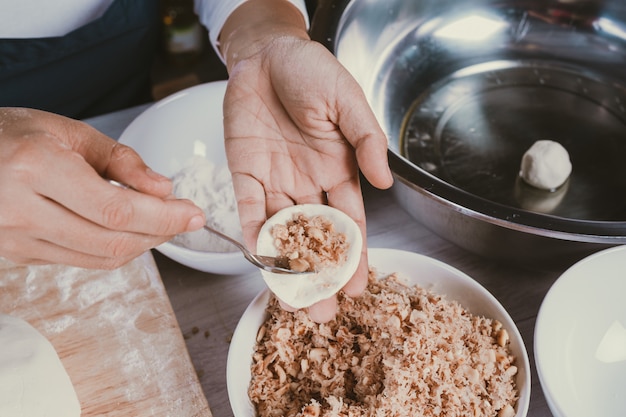
The Ultimate Guide to Tender, Juicy Pulled Pork
RecipesRight, let's talk pulled pork. It's one of those dishes that just screams "comfort food," doesn't it? I mean...
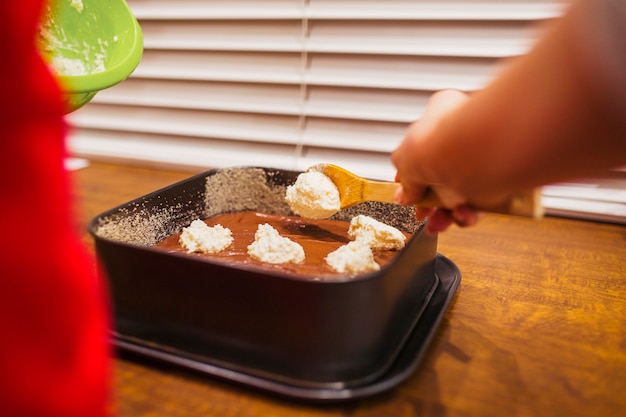
The Ultimate Guide to Cooking Delicious Frankfurters
RecipesLet's face it, we all love a good frankfurter. It's a classic, simple, and always satisfying. But let's be rea...
